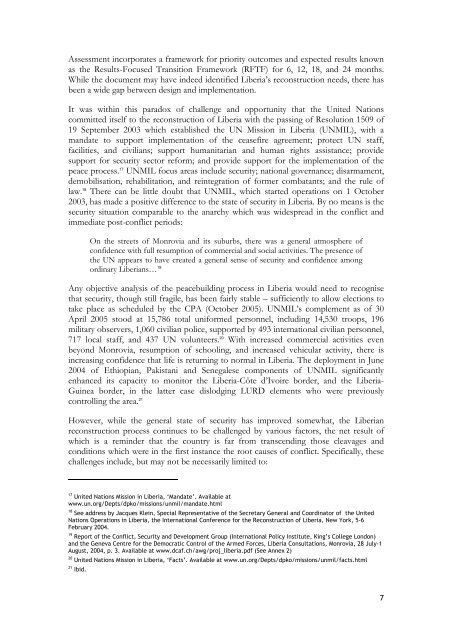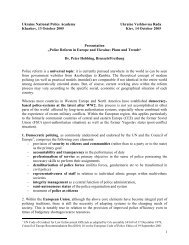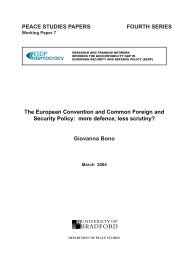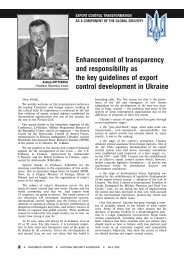The Challenges and Opportunities of Security Sector Reform in Post ...
The Challenges and Opportunities of Security Sector Reform in Post ...
The Challenges and Opportunities of Security Sector Reform in Post ...
Create successful ePaper yourself
Turn your PDF publications into a flip-book with our unique Google optimized e-Paper software.
Assessment <strong>in</strong>corporates a framework for priority outcomes <strong>and</strong> expected results known<br />
as the Results-Focused Transition Framework (RFTF) for 6, 12, 18, <strong>and</strong> 24 months.<br />
While the document may have <strong>in</strong>deed identified Liberia’s reconstruction needs, there has<br />
been a wide gap between design <strong>and</strong> implementation.<br />
It was with<strong>in</strong> this paradox <strong>of</strong> challenge <strong>and</strong> opportunity that the United Nations<br />
committed itself to the reconstruction <strong>of</strong> Liberia with the pass<strong>in</strong>g <strong>of</strong> Resolution 1509 <strong>of</strong><br />
19 September 2003 which established the UN Mission <strong>in</strong> Liberia (UNMIL), with a<br />
m<strong>and</strong>ate to support implementation <strong>of</strong> the ceasefire agreement; protect UN staff,<br />
facilities, <strong>and</strong> civilians; support humanitarian <strong>and</strong> human rights assistance; provide<br />
support for security sector reform; <strong>and</strong> provide support for the implementation <strong>of</strong> the<br />
peace process. 17 UNMIL focus areas <strong>in</strong>clude security; national governance; disarmament,<br />
demobilisation, rehabilitation, <strong>and</strong> re<strong>in</strong>tegration <strong>of</strong> former combatants; <strong>and</strong> the rule <strong>of</strong><br />
law. 18 <strong>The</strong>re can be little doubt that UNMIL, which started operations on 1 October<br />
2003, has made a positive difference to the state <strong>of</strong> security <strong>in</strong> Liberia. By no means is the<br />
security situation comparable to the anarchy which was widespread <strong>in</strong> the conflict <strong>and</strong><br />
immediate post-conflict periods:<br />
On the streets <strong>of</strong> Monrovia <strong>and</strong> its suburbs, there was a general atmosphere <strong>of</strong><br />
confidence with full resumption <strong>of</strong> commercial <strong>and</strong> social activities. <strong>The</strong> presence <strong>of</strong><br />
the UN appears to have created a general sense <strong>of</strong> security <strong>and</strong> confidence among<br />
ord<strong>in</strong>ary Liberians… 19<br />
Any objective analysis <strong>of</strong> the peacebuild<strong>in</strong>g process <strong>in</strong> Liberia would need to recognise<br />
that security, though still fragile, has been fairly stable – sufficiently to allow elections to<br />
take place as scheduled by the CPA (October 2005). UNMIL’s complement as <strong>of</strong> 30<br />
April 2005 stood at 15,786 total uniformed personnel, <strong>in</strong>clud<strong>in</strong>g 14,530 troops, 196<br />
military observers, 1,060 civilian police, supported by 493 <strong>in</strong>ternational civilian personnel,<br />
717 local staff, <strong>and</strong> 437 UN volunteers. 20 With <strong>in</strong>creased commercial activities even<br />
beyond Monrovia, resumption <strong>of</strong> school<strong>in</strong>g, <strong>and</strong> <strong>in</strong>creased vehicular activity, there is<br />
<strong>in</strong>creas<strong>in</strong>g confidence that life is return<strong>in</strong>g to normal <strong>in</strong> Liberia. <strong>The</strong> deployment <strong>in</strong> June<br />
2004 <strong>of</strong> Ethiopian, Pakistani <strong>and</strong> Senegalese components <strong>of</strong> UNMIL significantly<br />
enhanced its capacity to monitor the Liberia-Côte d’Ivoire border, <strong>and</strong> the Liberia-<br />
Gu<strong>in</strong>ea border, <strong>in</strong> the latter case dislodg<strong>in</strong>g LURD elements who were previously<br />
controll<strong>in</strong>g the area. 21<br />
However, while the general state <strong>of</strong> security has improved somewhat, the Liberian<br />
reconstruction process cont<strong>in</strong>ues to be challenged by various factors, the net result <strong>of</strong><br />
which is a rem<strong>in</strong>der that the country is far from transcend<strong>in</strong>g those cleavages <strong>and</strong><br />
conditions which were <strong>in</strong> the first <strong>in</strong>stance the root causes <strong>of</strong> conflict. Specifically, these<br />
challenges <strong>in</strong>clude, but may not be necessarily limited to:<br />
17<br />
United Nations Mission <strong>in</strong> Liberia, ‘M<strong>and</strong>ate’. Available at<br />
www.un.org/Depts/dpko/missions/unmil/m<strong>and</strong>ate.html<br />
18<br />
See address by Jacques Kle<strong>in</strong>, Special Representative <strong>of</strong> the Secretary General <strong>and</strong> Coord<strong>in</strong>ator <strong>of</strong> the United<br />
Nations Operations <strong>in</strong> Liberia, the International Conference for the Reconstruction <strong>of</strong> Liberia, New York, 5-6<br />
February 2004.<br />
19<br />
Report <strong>of</strong> the Conflict, <strong>Security</strong> <strong>and</strong> Development Group (International Policy Institute, K<strong>in</strong>g’s College London)<br />
<strong>and</strong> the Geneva Centre for the Democratic Control <strong>of</strong> the Armed Forces, Liberia Consultations, Monrovia, 28 July-1<br />
August, 2004, p. 3. Available at www.dcaf.ch/awg/proj_liberia.pdf (See Annex 2)<br />
20<br />
United Nations Mission <strong>in</strong> Liberia, ‘Facts’. Available at www.un.org/Depts/dpko/missions/unmil/facts.html<br />
21 Ibid.<br />
7

















